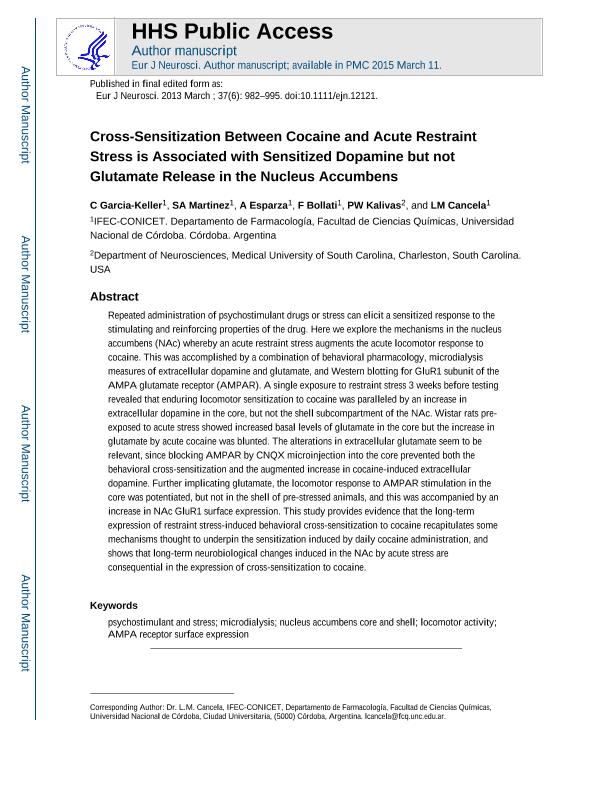Mostrar el registro sencillo del ítem
dc.contributor.author
Garcia Keller, Constanza

dc.contributor.author
Martinez, S. A.
dc.contributor.author
Esparza, Maria Alejandra

dc.contributor.author
Bollati, Flavia Andrea

dc.contributor.author
Kalivas, P. W.
dc.contributor.author
Cancela, Liliana Marin
dc.date.available
2020-03-19T16:33:04Z
dc.date.issued
2013-03
dc.identifier.citation
Garcia Keller, Constanza; Martinez, S. A.; Esparza, Maria Alejandra; Bollati, Flavia Andrea; Kalivas, P. W.; et al.; Cross-sensitization between cocaine and acute restraint stress is associated with sensitized dopamine but not glutamate release in the nucleus accumbens; Wiley Blackwell Publishing, Inc; European Journal Of Neuroscience; 37; 6; 3-2013; 982-995
dc.identifier.issn
0953-816X
dc.identifier.uri
http://hdl.handle.net/11336/100251
dc.description.abstract
Repeated administration of psychostimulant drugs or stress can elicit a sensitized response to the stimulating and reinforcing properties of the drug. Here we explore the mechanisms in the nucleus accumbens (NAc) whereby an acute restraint stress augments the acute locomotor response to cocaine. This was accomplished by a combination of behavioral pharmacology, microdialysis measures of extracellular dopamine and glutamate, and Western blotting for GluR1 subunit of the α-amino-3-hydroxy-5-methyl-4-isoxazolepropionic acid (AMPA) glutamate receptor (AMPAR). A single exposure to restraint stress 3weeks before testing revealed that enduring locomotor sensitization to cocaine was paralleled by an increase in extracellular dopamine in the core, but not the shell subcompartment, of the NAc. Wistar rats pre-exposed to acute stress showed increased basal levels of glutamate in the core, but the increase in glutamate by acute cocaine was blunted. The alterations in extracellular glutamate seem to be relevant, as blocking AMPAR by 6-cyano-7-nitroquinoxaline-2,3-dione microinjection into the core prevented both the behavioral cross-sensitization and the augmented increase in cocaine-induced extracellular dopamine. Further implicating glutamate, the locomotor response to AMPAR stimulation in the core was potentiated, but not in the shell of pre-stressed animals, and this was accompanied by an increase in NAc GluR1 surface expression. This study provides evidence that the long-term expression of restraint stress-induced behavioral cross-sensitization to cocaine recapitulates some mechanisms thought to underpin the sensitization induced by daily cocaine administration, and shows that long-term neurobiological changes induced in the NAc by acute stress are consequential in the expression of cross-sensitization to cocaine..
dc.format
application/pdf
dc.language.iso
eng
dc.publisher
Wiley Blackwell Publishing, Inc

dc.rights
info:eu-repo/semantics/openAccess
dc.rights.uri
https://creativecommons.org/licenses/by-nc-sa/2.5/ar/
dc.subject
AMPA RECEPTOR SURFACE EXPRESSION
dc.subject
LOCOMOTOR ACTIVITY
dc.subject
MICRODIALYSIS
dc.subject
NUCLEUS ACCUMBENS CORE AND SHELL
dc.subject
PSYCHOSTIMULANT AND STRESS
dc.subject.classification
Neurociencias

dc.subject.classification
Medicina Básica

dc.subject.classification
CIENCIAS MÉDICAS Y DE LA SALUD

dc.title
Cross-sensitization between cocaine and acute restraint stress is associated with sensitized dopamine but not glutamate release in the nucleus accumbens
dc.type
info:eu-repo/semantics/article
dc.type
info:ar-repo/semantics/artículo
dc.type
info:eu-repo/semantics/publishedVersion
dc.date.updated
2020-03-16T20:01:13Z
dc.identifier.eissn
1460-9568
dc.journal.volume
37
dc.journal.number
6
dc.journal.pagination
982-995
dc.journal.pais
Reino Unido

dc.journal.ciudad
Londres
dc.description.fil
Fil: Garcia Keller, Constanza. Consejo Nacional de Investigaciones Científicas y Técnicas. Centro Científico Tecnológico Conicet - Córdoba. Instituto de Farmacología Experimental de Córdoba. Universidad Nacional de Córdoba. Facultad de Ciencias Químicas. Instituto de Farmacología Experimental de Córdoba; Argentina
dc.description.fil
Fil: Martinez, S. A.. Consejo Nacional de Investigaciones Científicas y Técnicas. Centro Científico Tecnológico Conicet - Córdoba. Instituto de Farmacología Experimental de Córdoba. Universidad Nacional de Córdoba. Facultad de Ciencias Químicas. Instituto de Farmacología Experimental de Córdoba; Argentina
dc.description.fil
Fil: Esparza, Maria Alejandra. Consejo Nacional de Investigaciones Científicas y Técnicas. Centro Científico Tecnológico Conicet - Córdoba. Instituto de Farmacología Experimental de Córdoba. Universidad Nacional de Córdoba. Facultad de Ciencias Químicas. Instituto de Farmacología Experimental de Córdoba; Argentina
dc.description.fil
Fil: Bollati, Flavia Andrea. Consejo Nacional de Investigaciones Científicas y Técnicas. Centro Científico Tecnológico Conicet - Córdoba. Instituto de Física Enrique Gaviola. Universidad Nacional de Córdoba. Instituto de Física Enrique Gaviola; Argentina
dc.description.fil
Fil: Kalivas, P. W.. Medical University of South Carolina; Estados Unidos
dc.description.fil
Fil: Cancela, Liliana Marin. Consejo Nacional de Investigaciones Científicas y Técnicas. Centro Científico Tecnológico Conicet - Córdoba. Instituto de Física Enrique Gaviola. Universidad Nacional de Córdoba. Instituto de Física Enrique Gaviola; Argentina
dc.journal.title
European Journal Of Neuroscience

dc.relation.alternativeid
info:eu-repo/semantics/altIdentifier/url/http://www.ncbi.nlm.nih.gov/pubmed/23360446
dc.relation.alternativeid
info:eu-repo/semantics/altIdentifier/doi/http://dx.doi.org/10.1111/ejn.12121
Archivos asociados
